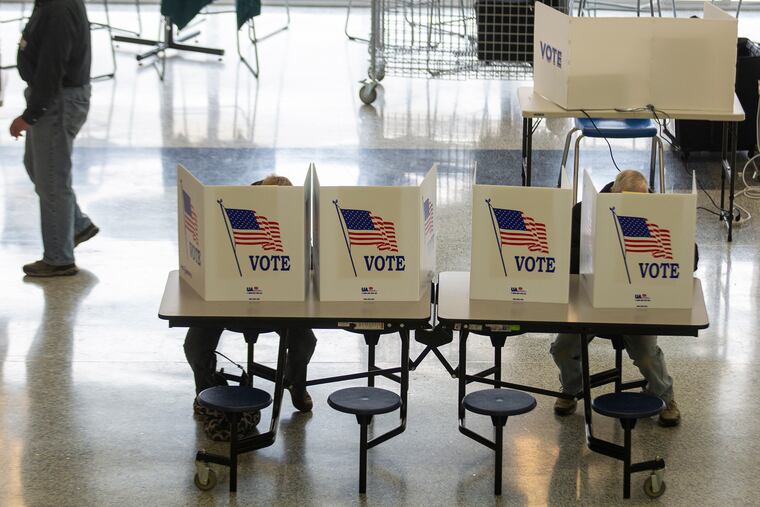How do you prevent a disputed 2020 election in Pennsylvania? Lessons from an expert panel.
Experts gamed out some worst-case scenarios for November. Now lawmakers need to act to prevent them, they said.

Imagine: Philadelphia election officials, overwhelmed by the number of voters requesting absentee ballots, can’t get them all in the mail in time. A state court orders a change in the deadlines in response to a lawsuit from voters.
A federal court disagrees and orders the deadlines remain unchanged. Officials are unsure which ballots to count. We don’t know who won Pennsylvania, and the White House hangs in the balance.
That was one of the scenarios discussed in a virtual gathering of national election law experts Monday, convened by Ohio State University’s Moritz College of Law. The discussion focused on current weaknesses in the electoral system, and ways to shore it up to prevent a disaster in November.
“You should try to predict things going wrong so that you can figure out what to do about it,” said Edward B. “Ned” Foley, one of the Ohio State law professors who organized the event. “When you think your ship is unsinkable … that’s where you’re in trouble, because it turns out you didn’t have enough lifeboats for the Titanic.”
Here are some takeaways:
State and federal courts could disagree
“State supreme courts are free to go beyond federal precedent,” said Michael T. Morley, a law professor at Florida State University. “They’re able to go beyond what a federal court would do.”
For example, the Pennsylvania Constitution guarantees that “elections shall be free and equal,” a clause that University of Kentucky law professor Joshua A. Douglas pointed out has been used to protect voting rights more broadly than the federal Constitution does.
But state and federal courts could disagree on how to fix an electoral problem. And there could be multiple competing lawsuits to untangle over how to run the election and which votes to count.
“I fear it’s going to be a turf war between federal and state courts,” said Samuel Issacharoff, a law professor at New York University.
Practical considerations of election administration really matter
Legal questions may seem high-minded, but many of the scenarios ended up relying on very concrete practical matters, such as elections officials’ ability to process absentee ballots.
It’s one thing to recognize a problem and another to fix it, Morley noted.
For example, after the U.S. Supreme Court ordered ballots in Wisconsin counted if they had been postmarked by the primary election date this April, thousands of ballots showed up with illegible postmarks or none. Local officials ended up making their own decisions, leading to a patchwork of policies across the state.
In Pennsylvania, a major Democratic political group is suing over the state’s mail-ballot laws, seeking changes to allow the counting of ballots that arrive within the week after an election if they are postmarked by an election day. (Current law requires them to be received by 8 p.m., when polls close.) A separate lawsuit was filed last week making similar arguments based on how the law should be applied during the pandemic.
Every change has an impact, and it’s hard to affect all voters equally
Much election law revolves around ensuring voters are treated equally, but that can get tricky. For example, if courts responded to a problem with absentee ballots in Philadelphia by changing deadlines for the entire state, that could increase the number of votes that are counted in other counties. (And given Pennsylvania’s increasingly firm political/geographic lines, that could affect the end results.)
That would mean a decision meant just to solve a problem in Philly — leveling the playing field — would inadvertently affect counties that experienced no problems but now have expanded deadlines.
Or consider the pandemic, which so far hasn’t affected the whole state equally. What’s the appropriate level of response to an outbreak in one town or county, and should it apply to other parts of the state?
Now’s the time to address potential election problems
“We know that state election officials are only going to be able to do so much, because they’re underfunded,” said Franita Tolson, a law professor and vice dean at the University of Southern California’s Gould School of Law. Because of funding constraints, she said, “we already know there are going to be problems.”
County election officials in Pennsylvania have already reported a number of challenges to the rescheduled June 2 primary election, including difficulties processing a large volume of absentee ballots.
Federal and state lawmakers should address some of the challenges, the experts said, through measures such as increasing funding for local officials and passing laws with clearer rules and contingencies for emergency situations.
“We need to get as many forces as we can mobilize to make sure there are alternative voting procedures in place everywhere before any of these nightmares play out,” said Norman J. Ornstein, a political scientist at the American Enterprise Institute, a conservative think tank in Washington.
Partisanship is a major concern
Even if state and federal lawmakers are pressured to act, experts said, extreme partisanship could prevent anything from happening.
“The fear here is we’re going to get significant partisan divide,” Foley said.
That was a fear clearly shared by other participants, who worried that Democrats and Republicans might disagree on whether to accept a court ruling and ultimately, whether election results are legitimate.
“This whole conversation drives home to me how profound the tension can end up being … between doing everything we can, including changes in rules at the last minute, to try to accommodate each and every individual voter, and opening up the legitimacy, at least as perceived by one set of partisans, about the outcome,” said Richard H. Pildes, a law professor at NYU.
That’s one reason to raise these concerns now, the experts said: If possible problems are discussed by the public now, they can be addressed before they have a chance to mess up the election.